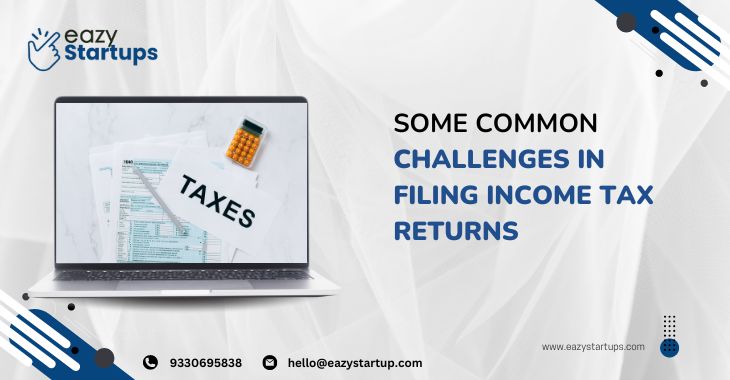Tax filing may be difficult, frequently accompanied by anxiety about making mistakes that could result in fines, postponed refunds, or even audits. Here are some typical pitfalls to avoid while submitting taxes to help you have a smooth tax season. If you apply for Online Income Tax Filing in India, contact Eazy Startups.
Let’s get into the discussion:-
- Inaccurate Personal Data
- Failing to Report All Income
- Ignoring the Submission Deadline
- Mathematical Errors
- Selecting an Incorrect Filing Status
- Neglecting Deductions and Credits
- Not Maintaining Accurate Records
- Overlooking Retirement Contributions
- Neglecting to Date and Sign Your Refund
- Ignoring the Alternative Minimum Tax
Inaccurate Personal Data:
Incorrectly entering personal information, such as names, addresses, and Social Security numbers, is one of the easiest yet most frequent blunders. Make sure that the data precisely corresponds to what is on your official documents. Processing your return could be significantly delayed by even a small misspelling.
Failing to Report All Income:
Not just your primary employment but all of your revenue sources must be included on your tax return. It covers earnings from investments, side jobs, and freelancing. Ignoring these may result in disparities and possible audits. To ensure you’ve included everything, use all your 1099 forms and additional income statements.
Ignoring the Submission Deadline:
Failure to pay your taxes by April 15 may be subject to fines and interest. If you can’t submit by the deadline, you could request an extension until October 15. But keep in mind that a filing extension is not a payment extension. By April 15, you still have to estimate your taxes and pay those that are due.
Mathematical Errors:
Mathematical mistakes can still happen in the era of tax software, especially when filing by hand. Verify your computations again, or better yet, utilize dependable tax software that does the math for you. It guarantees precision and lowers the possibility of errors.
Selecting an Incorrect Filing Status:
Making the right file status choice is important since it affects your tax rate and ability to claim certain credits and deductions. It can make a big difference if you’re a qualifying widow(er), head of household, married filing separately, jointly, or single.
Neglecting Deductions and Credits:
Too many taxpayers lose out on important credits and deductions because they are unaware of them. Deductions for state and local taxes, medical costs, and student loan interest are among the items that are frequently forgotten. Credits like the Child Tax Credit, Earned Income Tax Credit (EITC), and Education Credits can considerably decrease your tax payment. Do some research or speak with a tax expert to be sure you are getting the most out of your advantages.
Not Maintaining Accurate Records:
You must keep complete and well-organized records of all your financial paperwork year-round. W-2s, 1099s, receipts for deducted costs, and any other pertinent paperwork fall under this category. Maintaining accurate records facilitates filing processes and offers crucial evidence in the event of an audit.
Overlooking Retirement Contributions:
Contributions to retirement plans like 401(k)s and IRAs can have significant tax advantages. Ensure you accurately record these donations and utilize applicable credits or deductions. Be mindful of the deadlines and contribution caps to optimize your tax savings.
Neglecting to Date and Sign Your Refund:
A tax return that is not signed is deemed void. Whether filing on paper or online, don’t forget to sign and date your return. Spouses filing jointly need to sign the document.
Ignoring the Alternative Minimum Tax:
You can be liable to the Alternative Minimum Tax (AMT) if your income is higher. Individuals with large incomes or deductions pay a minimum amount of tax thanks to this parallel tax system. If unsure if you qualify for the AMT, use tax software or speak with an expert.
Conclusion
Steer clear of these typical blunders to guarantee a more correct and efficient tax filing procedure. If you apply for Online Income Tax Filing in India, contact Eazy Startups.










Recent Comments